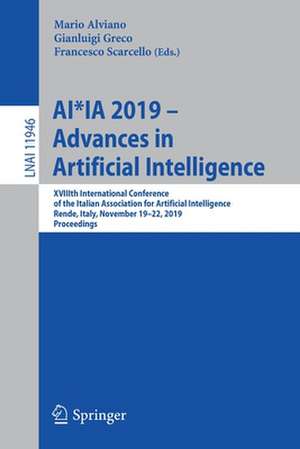AI*IA 2019 – Advances in Artificial Intelligence: XVIIIth International Conference of the Italian Association for Artificial Intelligence, Rende, Italy, November 19–22, 2019, Proceedings: Lecture Notes in Computer Science, cartea 11946
Editat de Mario Alviano, Gianluigi Greco, Francesco Scarcelloen Limba Engleză Paperback – 17 noi 2019
The 41 full papers were carefully reviewed and selected from 67 submissions. The papers have been organized in the following topical sections: Knowledge Representation for AI, AI and Computation, Machine Learning for AI, and AI and Humans.
Din seria Lecture Notes in Computer Science
- 20%
 Preț: 1061.55 lei
Preț: 1061.55 lei - 20%
 Preț: 307.71 lei
Preț: 307.71 lei - 20%
 Preț: 438.69 lei
Preț: 438.69 lei - 20%
 Preț: 645.28 lei
Preț: 645.28 lei -
 Preț: 410.88 lei
Preț: 410.88 lei - 15%
 Preț: 580.46 lei
Preț: 580.46 lei - 17%
 Preț: 427.22 lei
Preț: 427.22 lei - 20%
 Preț: 596.46 lei
Preț: 596.46 lei -
 Preț: 381.21 lei
Preț: 381.21 lei - 20%
 Preț: 353.50 lei
Preț: 353.50 lei - 20%
 Preț: 1414.79 lei
Preț: 1414.79 lei - 20%
 Preț: 309.90 lei
Preț: 309.90 lei - 20%
 Preț: 583.40 lei
Preț: 583.40 lei - 20%
 Preț: 1075.26 lei
Preț: 1075.26 lei - 20%
 Preț: 310.26 lei
Preț: 310.26 lei - 20%
 Preț: 655.02 lei
Preț: 655.02 lei - 20%
 Preț: 580.93 lei
Preț: 580.93 lei - 20%
 Preț: 340.32 lei
Preț: 340.32 lei - 15%
 Preț: 438.59 lei
Preț: 438.59 lei - 20%
 Preț: 591.51 lei
Preț: 591.51 lei - 20%
 Preț: 649.49 lei
Preț: 649.49 lei - 20%
 Preț: 337.00 lei
Preț: 337.00 lei -
 Preț: 449.57 lei
Preț: 449.57 lei - 20%
 Preț: 607.39 lei
Preț: 607.39 lei - 20%
 Preț: 1024.44 lei
Preț: 1024.44 lei - 20%
 Preț: 579.30 lei
Preț: 579.30 lei - 20%
 Preț: 763.23 lei
Preț: 763.23 lei - 20%
 Preț: 453.32 lei
Preț: 453.32 lei - 20%
 Preț: 575.48 lei
Preț: 575.48 lei - 20%
 Preț: 585.88 lei
Preț: 585.88 lei - 20%
 Preț: 825.93 lei
Preț: 825.93 lei - 20%
 Preț: 763.23 lei
Preț: 763.23 lei - 17%
 Preț: 360.19 lei
Preț: 360.19 lei - 20%
 Preț: 1183.14 lei
Preț: 1183.14 lei - 20%
 Preț: 340.32 lei
Preț: 340.32 lei - 20%
 Preț: 504.57 lei
Preț: 504.57 lei - 20%
 Preț: 369.12 lei
Preț: 369.12 lei - 20%
 Preț: 583.40 lei
Preț: 583.40 lei - 20%
 Preț: 343.62 lei
Preț: 343.62 lei - 20%
 Preț: 350.21 lei
Preț: 350.21 lei - 20%
 Preț: 764.89 lei
Preț: 764.89 lei - 20%
 Preț: 583.40 lei
Preț: 583.40 lei -
 Preț: 389.48 lei
Preț: 389.48 lei - 20%
 Preț: 341.95 lei
Preț: 341.95 lei - 20%
 Preț: 238.01 lei
Preț: 238.01 lei - 20%
 Preț: 538.29 lei
Preț: 538.29 lei
Preț: 348.39 lei
Preț vechi: 435.49 lei
-20% Nou
Puncte Express: 523
Preț estimativ în valută:
66.67€ • 69.52$ • 55.41£
66.67€ • 69.52$ • 55.41£
Carte tipărită la comandă
Livrare economică 21 martie-04 aprilie
Preluare comenzi: 021 569.72.76
Specificații
ISBN-13: 9783030351656
ISBN-10: 3030351653
Pagini: 606
Ilustrații: XIV, 606 p. 251 illus., 90 illus. in color.
Dimensiuni: 155 x 235 mm
Greutate: 0.86 kg
Ediția:1st ed. 2019
Editura: Springer International Publishing
Colecția Springer
Seriile Lecture Notes in Computer Science, Lecture Notes in Artificial Intelligence
Locul publicării:Cham, Switzerland
ISBN-10: 3030351653
Pagini: 606
Ilustrații: XIV, 606 p. 251 illus., 90 illus. in color.
Dimensiuni: 155 x 235 mm
Greutate: 0.86 kg
Ediția:1st ed. 2019
Editura: Springer International Publishing
Colecția Springer
Seriile Lecture Notes in Computer Science, Lecture Notes in Artificial Intelligence
Locul publicării:Cham, Switzerland
Cuprins
Knowledge Representation for AI.- Tight Integration of Rule-Based Tools in Game Development.- A Comparison of MCMC Sampling for Probabilistic Logic Programming.- Augmenting Datalog+- with Customizable Metalogic Features for Powerful Ontological Reasoning.- Memory Management in Resource-Bounded Agents.- A Rule-based System for Hardware Configuration and Programming of IoT Devices.- First Approach to Semantics of Silence in Testimonies.- Hybrid Semantics-aware Recommendations Exploiting Knowledge Graph Embeddings.- Strongly Equivalent Epistemic Answer Set Programs.- From simplified Kripke-style semantics to simplified analytic tableaux for some normal modal logics.- AI and Computation.- Automated Planning Encodings for the Manipulation of Articulated Objects in 3D with Gravity.- Frequency Assignment in High Performance Computing Systems.- PRONOM: proof-search and countermodel generation for Non-Normal Modal Logics.- Partitioned Least Squares.- Number of Minimal Hypergraph Transversals and Complexity of of IFM with Infrequency: high in theory, but often not so much in practice!.- Handling Modifiers in Question Answering over Knowledge Graphs.- A graphical analysis of integer infeasibility in UTVPI constraints.- Multi-Agent Path Finding with Capacity Constraints.- Evaluating Robustness of an Acting Framework Over Temporally Uncertain Domains.- On the Configuration of SAT Formulae.- Towards Effective Device-Aware Federated Learning.- Machine Learning for AI.- Performance-driven Handwriting Task Selection for Parkinson’s Disease Classication.- A non-negative factorization approach to node pooling in graph convolutional neural networks.- Winograd Convolution for DNNs: Beyond linear polynomials.- A Deep Hybrid Model for Recommendation Systems.- Kernel-based Generative Adversarial Networks for Weakly Supervised Learning.- Activity Prediction of Business Process Instances with Inception CNN Models.- Question Classification with Untrained Recurrent Embeddings.- Prediction of Decline in Activities of Daily Living Through Deep Artificial Neural Networks and Domain Adaptation.- Capturing Frame-like Object Descriptors in Human Augmented Mapping.- Verification and Repair of Neural Networks: a Progress Report on Convolutional Models.- Learning Activation Functions by means of Kernel Based Neural Networks.- Leveraging Multi-task Learning for Biomedical Named Entity Recognition.- Applying Self-Interaction Attention for Extracting Drug-Drug Interactions.- Learning abstract planning domains and mappings to real world perceptions.- Measuring the Polarization of Hate Speech Annotation.- AI and Humans.- Manipulating an Election in Social Networks through Edge Addition.- Shared-Autonomy Navigation for mobile robots driven by a door detection module.- Toward Automated Courseware Production for the ExPLoRAA Tutoring Environment.- Artificial Intelligence for dramatic performance.- Periodicity Detection of Emotional Communities in Microblogging.-Mapping Lexical Knowledge to Distributed Representations for Ontology Concept Invention.
